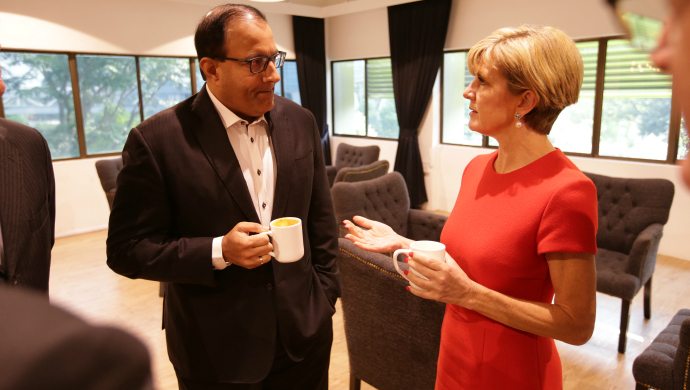Both countries ranked high in a global creativity ranking — which Landing Pad hopes will lead to smooth integration of Australian startups

The Australian government has brought its Landing Pad programme to Singapore, officially launching the global startup initiative in Block 79’s BASH startup space today.
Landing Pad is run by the Australian Trade and Investment Commission (Austrade) and it works to help Australian startups integrate into the partner nation and region. Cities that also have Landing Pads are Berlin, San Francisco, Shanghai and Tel Aviv.
The initiative was kicked-off by S Iswaran, Singapore’s Minister for Trade and Industry and Australia’s Minister for Foreign Affairs, Julie Bishop.
“Besides increasing entrepreneurial activity and venture funding, another essential factor for innovation is the free flow and exchange of information and ideas between individuals, companies, institutions and countries,” said Iswaran in a speech.
“This landing pad serves precisely that purpose. It will enable its participants to traverse geographical and cultural boundaries, fostering an open mindset that enables collaborations and partnerships for innovation.”
Bishop highlighted that Landing Pad was part of an agreement inked between Australia and Singapore in May 2016 called the Singapore-Australia Comprehensive Strategic Partnership. The goal of the agreement is to deepen economic integration, strengthen defense ties, promote entrepreneurship and innovation as well as foster ‘People-to-people ties’.
Referring to a global study from the University of Toronto’s Martin Prosperity Institute, Bishop underscored the benefits of bringing Australia’s entrepreneurial spirit to Singapore.
“Australia was judged the most creative nation on earth. People are risk takers, innovative and they need an outlet for their ideas. Here in Singapore we will see many Australians meet with like-minded people and who knows what will [happen],” she said.
The Lion City was the highest-rated Asian city and came in ninth globally, setting the table for collaboration.
Also Read: Singtel announces tie-up with polytechnics to help F&B businesses go digital
When asked by a reporter about the metrics Landing Pad will use to measure success, Bishop said, “Clearly by the number of startups that take their ideas further”. She also mentioned “competitive spirit”.
For startups interested in Landing Pad, they will receive a short-term operations base at BASH for 90 days, a foot into Austrade’s global network and contacts tailored to assist the companies.
Applications are now open for placement in any of the five cities mentioned above.
The pioneering four
There are actually already four companies participating in Singapore’s Landing Pad Programme. They are named ebilities, hipflask, Quitch and Zed Technologies. The companies are incorporated in both Australia and Singapore. Let’s take a peek.
ebilities
ebilities aims to identify workplace skills such as agility and problem solving to help companies hire better. For example, it uses mental tests to try to pinpoint someone that has self-confidence in their abilities, but does not cross over the line into arrogance.
The ‘mental agility tests’ are designed to be used anywhere in the world.
Hipflask
Hipflask wants to help event platforms attract and engage audiences by delivering personalised city guides to users. So for example, if a friend is heading a cool concert tomorrow night, the event may get priority in the feed. Hipflask also aggregates favourite locations and event categories so everyone’s feed is different.
For a user, the app eventually learns more about the person over time for more targetted event listings. For organisers, this provides an opportunity to reach out to the people who are most likely to actually buy a ticket and show up.
Quitch
This startup wants to help increase engagement for students in the classroom. It is an increasingly important challenge in our modern world full of gadgets, devices and media overload. The app is built around the idea of ‘using the same tools that are distracting them to re-engage them with study’.
Also Read: Jogjakarta to ban the use of ride-hailing apps, following Bandung’s footsteps
Additionally, educators will get timely feedback on student’s performance and be able to see each individual’s level of comprehension.
Zed Technologies
Zed Technologies wants to be the go-to company for cloud-based delivery of medical imaging. The idea is to give ‘anywhere’ access to important medical information which will help reduce repeat scanning. They also hope to reduce film and CD waste from the old system.
The company says it has already delivered over 4 million X-rays and scans to over 15,000 doctors.
—
Photos courtesy of SGInnovate
The post Australia launches Landing Pad in Singapore, offers Aussie startups network into ASEAN appeared first on e27.